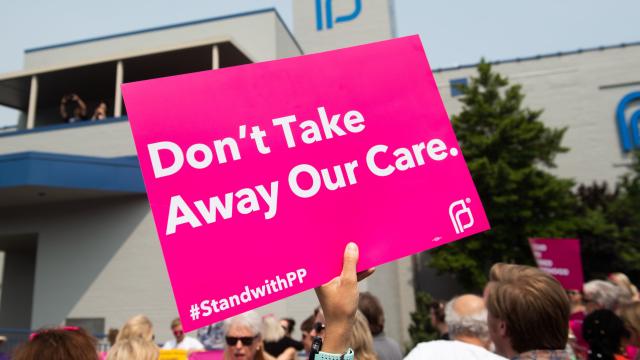In many places across America, it’s become harder for women to obtain an abortion. But a study out Thursday highlights an added challenge for teenage girls living in Texas and elsewhere: Judges who refuse to let them get an abortion without the involvement of their parents.
Legally, the U.S. Supreme Court has ruled since 1979 that no one can veto a minor’s decision to seek an abortion, including their parents. But 37 U.S. states have gotten around this decree by enacting so-called parental involvement laws. Some of these states require minors to first notify their parents; in other states, including Texas, minors need express permission from one or both parents. The legal loophole for these states is that minors have the option to petition a judge to avoid having their parents involved, provided they meet certain criteria, such as reasonably fearing that telling their parents could lead to abuse.
Judges, however, still have the power to outright deny access to abortion care without parental involvement. According to lead author Amanda Jean Stevenson, a sociologist at the University of Colorado Boulder who has studied the impact of restrictive abortion laws, there’s been little research on how often these denials actually happen. That’s especially important to know in Texas, which passed a law in 2016 that made the process harder to successfully navigate, including by requiring minors to see the judge in person rather than remotely and creating a stricter burden of evidence for approval.
In their new study, published Thursday in the American Journal of Public Health, Stevenson and her co-authors looked at the rate of denials in Texas before and after the 2016 law, over a 17-year period.
To track the denial rate from 2001 to 2016, they were only able to look at cases brought by the non-profit Jane’s Due Process, which has been providing legal representation for minors in Texas since 2001 (the state’s parental involvement law was enacted the year before). From 2016 to 2018, they were able to rely on official state records as well.
In the years prior to 2016, the team found that annual denial rates never reached over 6 per cent, while some years saw no denials at all and the overall denial rate shrank as time went on. But in the first year after the law passed, the denial rate jumped to 13 per cent across all cases. Though rates did drop during the next two years, they were still higher than before the law passed.
“Denials can impact minors’ lives because they can lead to being denied a wanted abortion,” Stevenson told Gizmodo via email. “High-quality evidence shows that being denied a wanted abortion is associated with worse socioeconomic, psychological, and physical health outcomes.”
The new study can’t provide information on why these denials happened. But in an earlier study, Stevenson and others interviewed women who had gone through the process. They found evidence that judges sometimes blankly dismiss these requests without any reason given at all or by offering justifications that don’t seem to meet any legal standard. And even when the requests are granted, the process can often prove a gruelling barrier for women to overcome.
“We and other scholars have found that—even in cases where the bypass is eventually granted—the process delays care and is humiliating, nerve-racking, and often traumatising,” she said. “In our interview study, some young women described judges inviting religious officials to confidential hearings or appointing them as guardians-ad-litem in order to try to get the young women to change their mind about abortion.”
Despite overall popular support for less restrictive abortion laws, the findings are the latest to show that many women in the U.S. are facing an uphill climb in securing their right to safe reproductive health care. And while there are relatively simple ways to broaden access to abortions, the current GOP-led White House and lawmakers in many states are unlikely to pursue them.
“The most effective way to prevent denials is not to require parental involvement in abortion access at all, since then no teens would have to go through the potentially traumatising process of seeking a bypass or be exposed to the risk of being denied a wanted abortion by being denied a judicial bypass,” Stevenson said.
Another study published this month highlights the dangers of restricting access to abortions. Researchers at the Texas Policy Evaluation Project found that about 7 per cent of women who sought abortions at Texas clinics had previously tried to induce an abortion on their own, without medical care—a desperate action that can lead to serious injury or death.
